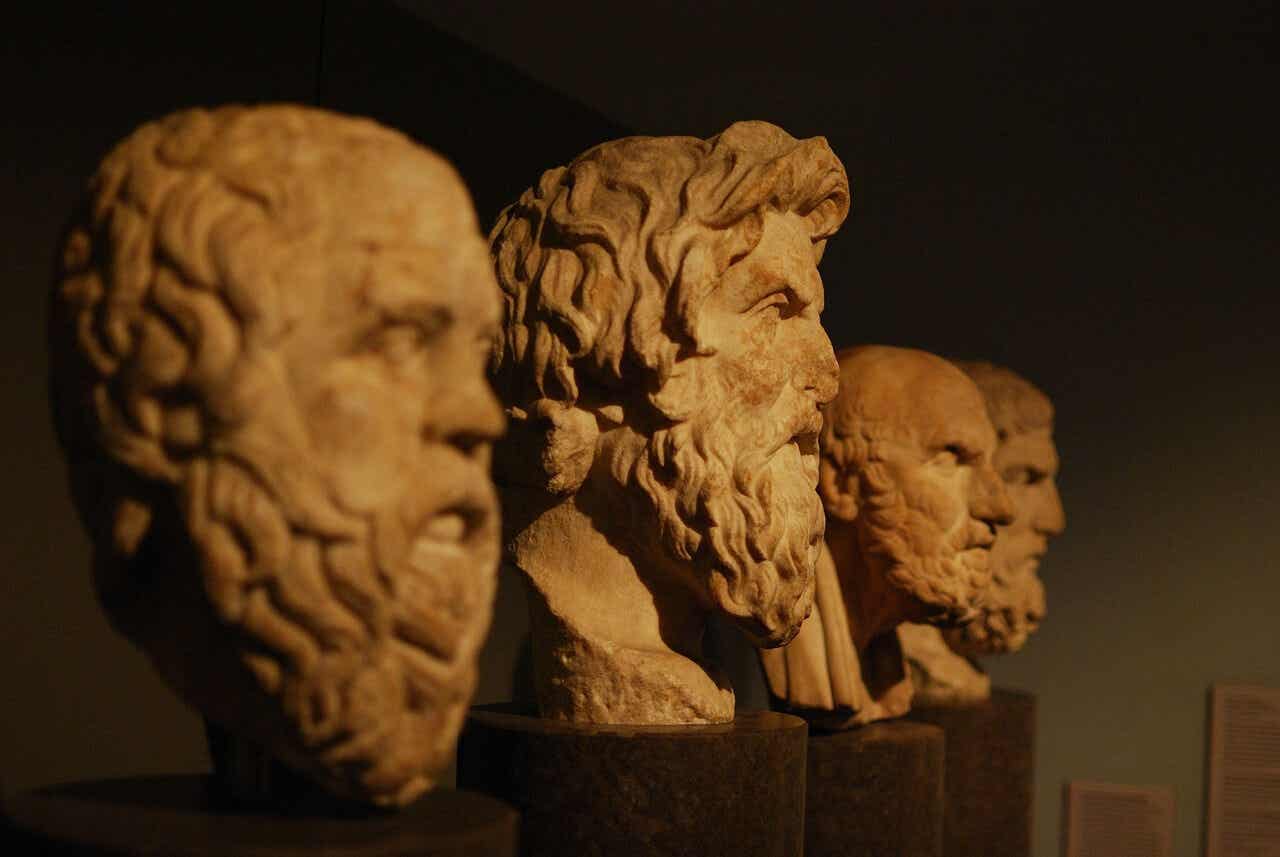The Differences Between the Philosophies of Aristotle and Plato


Written and verified by the philosopher Maria Alejandra Morgado Cusati
The philosophies of Aristotle and Plato are perhaps the most influential in the thinking of Western culture. Most of the philosophical and scientific currents that arose later have used them as the basis of their approaches.
However, although Aristotle was a disciple of Plato, the latter had many disagreements with his master. That’s why we’ll present the main differences between both of their philosophies.
The differences between Aristotle’s and Plato’s philosophies
We can group the discrepancies between the philosophies of Aristotle and Plato into the following categories: ont0logical, epistemological, and ethical.
Aristotle and Plato had ontological differences
At the moment of explaining the being of things, Plato states that there are two realms: One sensible (physical) and the other intelligible (that of ideas).
The first consists of everything that we can experience through the senses. It’s characterized by multiplicity, by being pure appearance, and by constantly changing. Therefore, it’s false and deceptive.
In contrast, the realm of ideas is true, incorruptible, and immutable. There dwell the universal and necessary ideas, which are the essences of all that exists.
Therefore, the objects and bodies of the physical realm are merely imperfect reflections of this world. For example, in the sensible realm, there’s a multiplicity of cats, and each individual is different from another. But, in the intelligible world, there’s an absolute idea of a cat, which makes it a cat and not something else.
Aristotle, on the other hand, denies the existence of an intelligible world. For him, there is only one true world: the sensible world, which consists of substances, which consist of matter and form (their essence).

You can also read: The Eastern Philosophy to Save Money at Home
Epistemological differences
Regarding the explanation of human knowledge, Plato defended the idea that we could acquire true knowledge by accessing the world of ideas. This is because, as we stated, everything in the sensible world is nothing more than appearance and deception.
So then, how do we come to know these ideas?
For Plato, all humans have a soul, which the body contains. Inside the soul lies the whole source of scientific knowledge, for the soul already knows the ideas because it was in the intelligible world. Therefore, the most appropriate term isn’t to know but, rather, to remember.
In this sense, Plato’s an advocate of innate ideas and the immortality of the soul. That said, he suggests that the only valid method to access the memories of the soul is the dialectic. This is a process of ascension, through reason, that goes from ignorance to the contemplation of ideas.
On the other hand, Aristotle defends the idea that we find the origin of truth in the sensible world. For this thinker, we can only acquire scientific knowledge through its causes. Therefore, the senses are the origin of all knowledge.
For Aristotle, there are no innate ideas. Instead, he affirms that the mind is a tabula rasa and that only through a process of abstraction is it possible to arrive at the essence.
Similarly, Aristotle rejects the method his teacher proposes. For him, induction and deduction are the only scientific methods of knowledge.
Aristotle and Plato had ethical differences
Another difference between the philosophies of Aristotle and Plato is the conception of the ethically good.
For Plato, there’s a link between ethics and knowledge. This is because, according to this thinker, the only way to access good and moral perfection is through a progressive approach to truth. Therefore, anyone who does wrong does so because they’re ignorant.
This makes sense within his philosophy. For Plato, there’s an idea of good, which we can only access through the scientific method he proposed.
Aristotle, on the other hand, formulates finalistic and eudemonistic ethics, defending the idea that the purpose of life is to achieve happiness. According to this philosopher, we obtain morally good actions by achieving a middle ground between generosity and selfishness.
That is, between a detached and altruistic attitude towards others and an interest in our own welfare. This balance is identified by reason. So, if we recognize it, we’ll be able to achieve happiness.
Discover more: The Keys to Happiness, According to Science
Anthropological differences
As for the conception of the human being, Plato suggests an anthropological dualism. He affirmed that all people are constituted by two different and independent substances: The body and the soul. The former belongs to the sensible world and the latter to the intelligible.
As we’ve already said, for Plato, the soul is immortal and can live separately from the body. Therefore, after the death of the body, it returns to the world of ideas. What’s more, according to this philosopher, the human soul has three parts: One rational, one irascible, and one concupiscible.
For Aristotle, on the other hand, the human being is a single substance, composed of matter (body) and form (soul). The soul’s the vital motor but it can’t live separately from the body. In this case, Aristotle distinguishes three types of soul: vegetative, sensitive, and rational.

The similarities between the philosophies of Aristotle and Plato
Although there are profound differences between the philosophies of Aristotle and Plato, the influence that the master had on his disciple can’t be denied.
In fact, they’re similar in some ways, since both posed essentialism. That is, they affirm that all things in the world have an essence that makes things to be what they are and not something else.
At the same time, both philosophers defend the existence of an eternal entity, which doesn’t belong to the sensible and is the most real thing that exists. For both Aristotle and Plato, this entity is the cause of all reality.
In religious terms, it would be God the creator of the universe. However, Plato represented him with the idea of good, while Aristotle represented him through his notion of the unmoved mover.
Philosophy after Aristotle and Plato
The ideas of both thinkers influenced the emergence of different currents of Western thought. Their ideas permeated different philosophical, political, scientific, and religious positions. Some of their influences can be found in empiricism, idealism, rationalism, and Christianity.
All cited sources were thoroughly reviewed by our team to ensure their quality, reliability, currency, and validity. The bibliography of this article was considered reliable and of academic or scientific accuracy.
- Frede D. Plato’s Ethics: An Overview [Internet]. Estados Unidos: Stanford Encyclopedia of Philosophy; 2017 [Consultado el 27 jun 2021]. Disponible en: https://plato.stanford.edu/entries/plato-ethics/
- Pérez Estévez Antonio. Diálogo, verdad y alteridad en Platón. Utopía y Praxis Latinoamericana [Internet]. 2001;6(13):9-35. Recuperado de: https://www.redalyc.org/articulo.oa?id=27901302
- Robinson H. Dualism [Internet]. Estados Unidos: Stanford Encyclopedia of Philosophy; 2020 [Consultado el 27 jun 2021]. Disponible en: https://plato.stanford.edu/entries/dualism/#HisDua
- Shields C. Aristotle [Internet]. Estados Unidos: Stanford Encyclopedia of Philosophy; 2020 [Consultado el 27 jun 2021]. Disponible en: https://plato.stanford.edu/entries/aristotle/
This text is provided for informational purposes only and does not replace consultation with a professional. If in doubt, consult your specialist.








